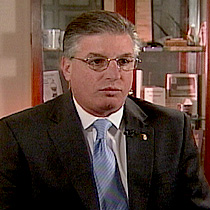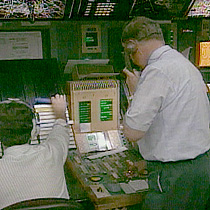2007年VOA标准英语-Airport Delays Growing Longer and More Frequent(在线收听)
Washington, D.C.
21 June 2007
Government and industry officials say America's crowded airways are becoming more so. The technology exists to make air travel safer, and energy efficient, but so far efforts to improve the situation are moving slowly. VOA's Paul Sisco reports.
Airline industry analysts say that, on average, air traffic controllers track 5500 aircraft over the United States at any given moment, and that number will triple by the year 2025.
 |
| Perter Dumont, president of the Air Traffic Control Association |
Earlier this month in Atlanta, Georgia weather-related delays canceled hundreds of flights.
The situation was at least as bad at Newark International Airport in New Jersey, the New York airports and elsewhere.
"I would say it's a global problem,” says Dumont. “It is more prominent here in the U.S. because we have more traffic than anywhere else, but it's going to expand globally."
 |
| Air traffic controllers |
Pilot Karen Lee agrees, it is time for an overhaul. "It's like driving down the road with a paper bag over your head."
Lee flies for a delivery service that is experimenting with planes guided by satellite technology instead of radar.
Radar updates a location every 12 seconds, and storms or mountains can block its signal. But with signals from global positioning satellites and the ground, pilots and controllers have more complete information in real time.
Basil Barimo, of the Air Transport Association, adds, "What we end up with is a very precise location for each aircraft in the system." Barimo says that would allow planes to fly closer together, and often fly more direct routs.
Pilot Karen Lee sees other benefits. "We'll be able to save a lot of gas, and we are going to be able to eliminate a lot of emissions coming out the back end of our engines. It's wonderful."
Peter Dumont emphasizes the scope of the problem. "This has to happen or we're going to have gridlock at all of our airports. Last year was the worse year for delays. This is going to be worse. If we keep going forward, by 2025 it will cost us 50 billion dollars."
The U.S. Congress wants the airlines to help pay for it. The airlines say they cannot afford to. In the meantime, air travelers had better prepare to wait.